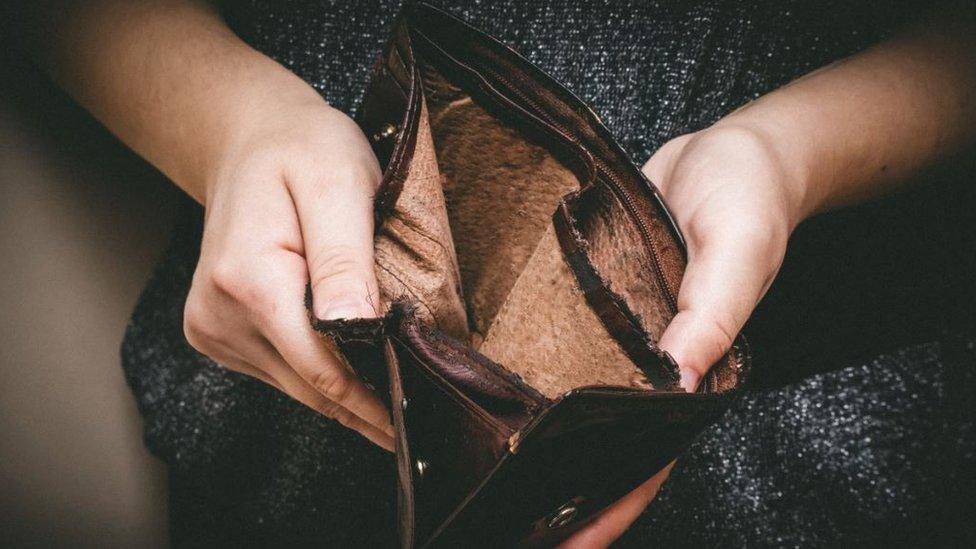Scottish Child Payment to rise to £25 as part of child poverty action plan
- Published
- comments
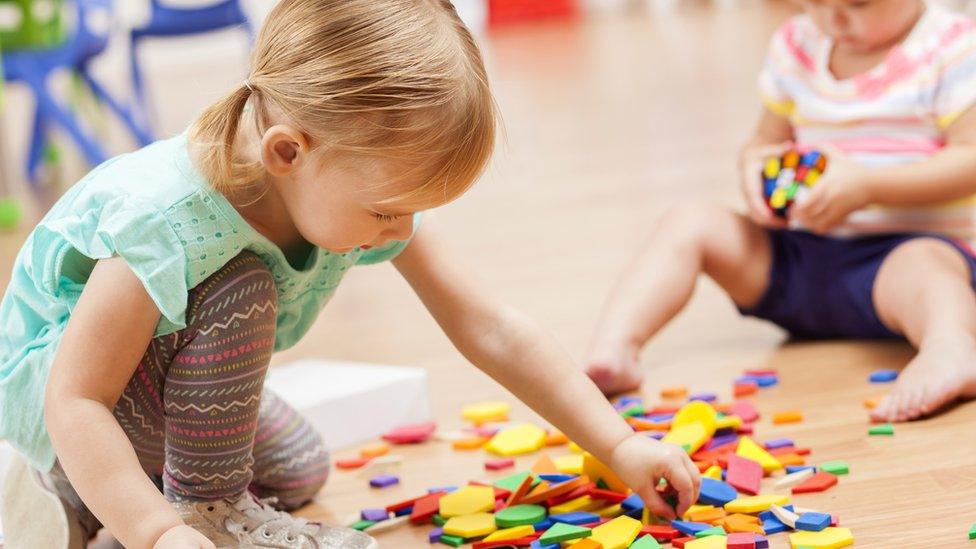
The Scottish Child Payment is to increase to £25 as part of the Scottish government's child poverty action plan.
It is also providing an extra £53m to employment services and creating a new £15m transitions fund to support parents into work.
And it has vowed to further increase access to childcare.
Poverty groups have called for more immediate support to protect families in Scotland from the current cost-of-living crisis.
Through the Child Poverty (Scotland) Act 2017, the Scottish government has pledged to reduce relative child poverty to less than 18% by 2023-24, before dropping to less than 10% by the end of the decade.
In a statement to the Scottish Parliament, Social Justice Secretary Shona Robison said that by 2023-24, it was anticipated that about 17% of children would be living in relative poverty, with more than 60,000 fewer children living in poverty since the act was passed.
Relative poverty is a measure of whether the lowest-income households are keeping pace with middle income households across the UK. This equates to being below about 60% of median income - under £18,000 a year for a family.
Ms Robison said a focus on long-term parental employment opportunities, strengthened social security and support to reduce household costs were at the heart of the new four-year delivery plan, called Best Start, Bright Futures.
And she added that in the coming year, the Scottish government would be investing a total of £113m on top of funding already allocated.
Ms Robison said the plans included:
Significantly increasing employment services with the aim of supporting up to 12,000 parents to enter and progress in sustainable and fair work with initial investment of up to £81m in 2022-23
Increasing the Scottish Child Payment from £20 to £25 per week when the benefit is extended to under-16s by the end of 2022. This means £1,300 of support per eligible child per year.
Delivering a new Parental Transition Fund to tackle the financial barriers parents face in entering the labour market
Taking immediate steps to mitigate the UK government's benefit cap as fully as possible within devolved powers, through discretionary housing payments
The Scottish Child Payment, external will rise from £10 to £20 per week from April then by the end of the year will increase to £25 when it will also be extended to under-16s.
She said: "I am proud that our actions of the past four years, together with those set out in this plan, are projected to deliver the lowest level of child poverty in Scotland in 30 years.
"We are taking immediate steps to put cash in the pockets of families - tackling the cost-of-living crisis and helping to lift thousands of children out of poverty in Scotland.
"Our package of five family benefits for low-income families, including the increased Scottish Child Payment, will be worth over £10,000 by the time a family's first child turns six, and £9,700 for second and subsequent children."
She said this would mean a difference of more than £8,200 for every eligible child born in Scotland in comparison with England and Wales.
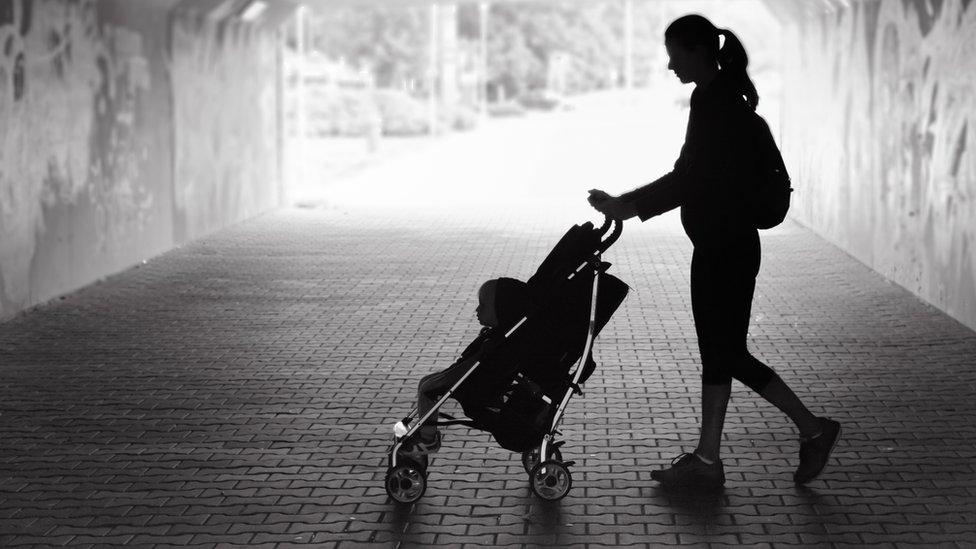
Ms Robison said new skills and training opportunities would be given to parents to help reduce household costs and drive longer-term change.
"Our national mission to tackle child poverty is already giving more children the best start and a bright future," she said. "We are determined to meet our ambitious targets set for 2023-24 and 2030 and beyond, so that no children in Scotland are living in poverty.
"We know there is not a silver bullet and this cannot be done overnight."
Scottish Labour's Pam Duncan-Glancy said: "A plan that leaves one in six children in absolute poverty is nothing to be proud of. We should be using every power at our disposal to lift as many children out of poverty, not crossing our fingers and hoping to scrape past our targets by the skin of our teeth."
Conservative MSP Miles Briggs said: "I would like to see us develop a plan to go further and to ban children living in temporary and unsuitable accommodation. That's something which we could have had in this document, which I'm sorry to say is not there."
Last week, think tank, the Institute of Public Policy Research (IPPR) predicted the Scottish government would not hit its target of reducing child poverty to less than 10% by 2030 as the measures in place at the time did not go far enough.
And the Poverty and Inequality Commission has said more work is needed on longer-term initiatives to make a real difference.
'Downward trajectory'
The social justice secretary said that four years ago, when the government announced its plans, no-one could have predicted the global pandemic, cost-of-living crisis, uncertainty and instability of Brexit or the war in Ukraine which had led to a humanitarian crisis. She also highlighted the fact that the UK government had cut Universal Credit by £20.
Previous government figures suggested that child poverty was "gradually rising" in Scotland before the Covid pandemic.
Statistics for the three-year period to March 2020 suggested that poverty overall had stabilised in Scotland but that more children had slipped below the poverty line.
It was estimated that 24% of children in Scotland - 240,000 each year - were living in relative poverty after housing costs.
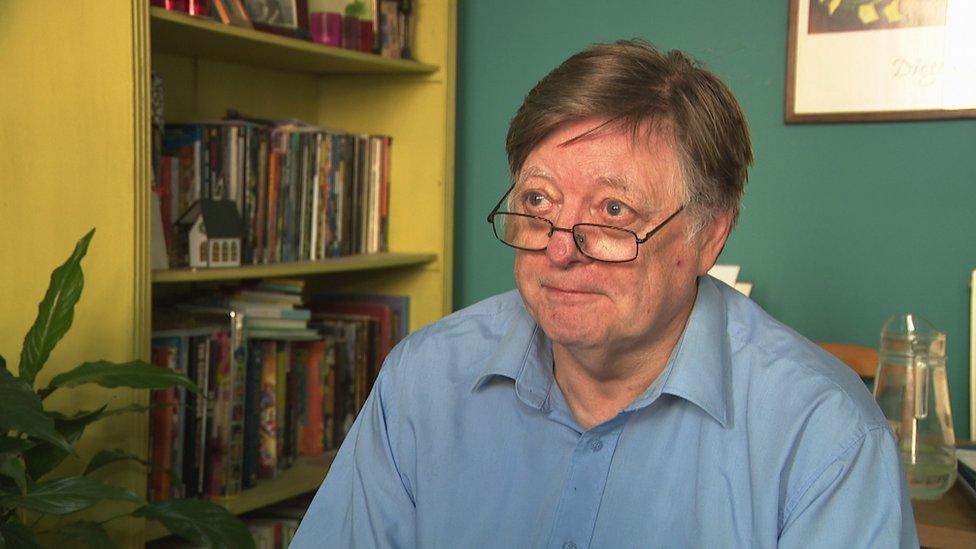
Bill Scott said more needed to be done to tackle child poverty
John Dickie, director of the Child Poverty Action Group (CPAG) in Scotland welcomed the new payments but said: "More immediate support is also needed to protect families through the current cost-of-living crisis."
The Joseph Rowntree Foundation's associate director for Scotland, Chris Birt, said: "These actions should put child poverty in Scotland on a downward trajectory and hopefully on course to meet the child poverty targets."
But he added that the UK and Scottish governments would have to do more to tackle the cost-of living crisis.
The Poverty Alliance said the Child Payment should be increased to £40.
'Real destitution happening'
Bill Scott, chairman of the Poverty and Inequality Commission for Scotland, told BBC Scotland: "In terms of real poverty, in 2019, 50,000 children in Scotland went without food, adequate clothing, heating or a roof over their heads.
"It's not just relative poverty - that affects about 240,000 children - there's real destitution happening in Scottish society and we, as a commission, believe that's intensifying and more children are being drawn into it.
"It's quite likely that during the pandemic a lot more children went without food or heating or adequate clothing, simply because a lot of families' incomes were reduced."
He added: "It's those longer-term initiatives - employment, wages, housing - they can all make the long-term difference and they have a more permanent effect. You get a higher-wage economy, more people in work - it's a virtuous cycle - people in work spend money to keep other people in work."
Related topics
- Published29 November 2021

- Published25 March 2021

- Published5 October 2020
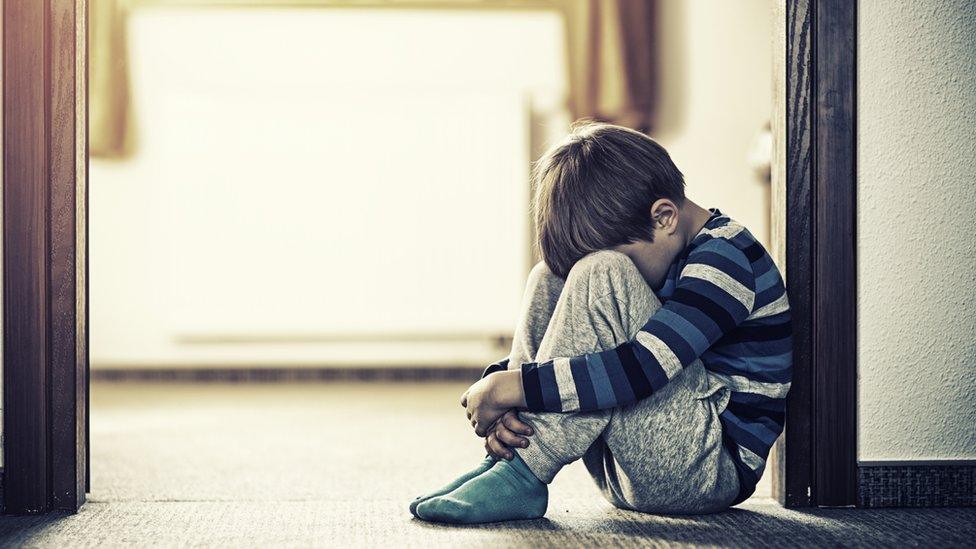
- Published24 May 2019

- Published28 March 2019
